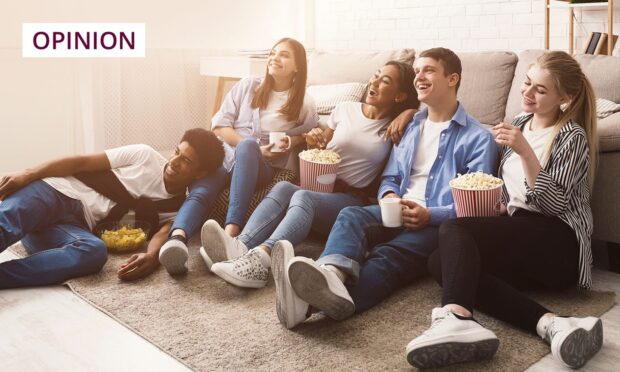I don’t care what anyone else says: teenagers are amazing. (Hear me out, folks.)
I spent my weekend solely in the company of teenagers. Not just my own, but several others, too. In fact, I spend a lot of time with teenagers.
My twins turned 15 yesterday, so we had a wee party. It all went brilliantly, apart from the burn mark in my charity-shop-find Ercol table and the hole in my handed-down lace tablecloth, which has only been laid out once. (This was due to an unhinged cake sparkler, nothing malicious.)
My contention is that teenagers get a bad rap, and it’s just not right. Society in general mistrusts them, makes fun of them, denigrates them and demonises them, way more than any other group.
OK, you’re thinking, she sees her kids through those rose-tinted, parent glasses. No, I’m not just talking about my own flesh and blood. I’m talking about all the kids I spend time with.
Yesterday, I chatted with the other teenagers about the Beastie Boys, Edwyn Collins, Tame Impala, injury rehabilitation, interior design, the education system, how we use language to support or deny people’s rights, PhDs, cake, dairy intolerance, roots (the hair kind), eyeliner and the 1990s fashion comeback. My only disapproval was the youngsters’ consensus that I should “go silver fox”. Not a chance.
All this in-depth discussion, while they’re going through such a vital stage in their development. Adolescence is a critical period of neurological change, and, far from being a somehow lesser version of the adult brain, the adolescent brain is scientifically amazing.
The function of adolescence is to create a sense of self. Teenagers achieve this through creating new allegiances, which is why friendships suddenly become so painfully important. But, when nothing matters more than peer approval, this inevitably creates a hypersensitivity to being excluded.
Reclaim the relationship and communicate with your teenagers
One of my favourite writers on the human experience, neuroscience and connection is Gabor Maté, a doctor based in Vancouver. I don’t usually read parenting books – someone bought me one of those how-to-make-your-child-sleep books when I was a new mother, and I tried not to look at them in horror – but I have read Hold on to Your Kids: Why Parents Need to Matter More Than Peers.
Maté co-wrote the book with developmental psychologist, Gordon Neufeld, addressing the concern that kids are slipping from parental grasp, becoming a lost generation. I read it when my children were tiny, for a work project, and what struck me was Maté and Neufeld’s argument that our children’s challenging behaviours are not behavioural problems, but rather relationship problems. This has stayed with me.
At the heart of the relationship problem is what Neufeld and Maté call “peer orientation”. An increasing attachment to peers is inevitable. But what if that attachment begins to override the primary one, to caregivers? What should you do if you feel you have “lost” your child to their peers?
I think the answer is to reclaim the relationship. That’s why I want my home to be open to my kids and their pals. I want them to feel comfortable under my roof. I don’t want the communication to stop.
Which is not to say I haven’t made mistakes. I’ve probably made every parental mistake in the book. But how many years have I truly got left with them? And what do I want from those years?
Fundamentally, it’s all about connection. And trusting my instinct, which always told me that parenting is a relationship. The relationship changes over time, but the intention doesn’t. If things aren’t working, then it’s a matter of re-evaluating what Maté describes as the “architecture” of the relationship.
The past few years have been incredibly tricky, and I’ve been responsible for some cracks in that architecture. But failing at times is inevitable, so being able to step back, reassess and change direction has come as a huge relief.
We ‘elders’ could learn a lot from younger generations
When it comes to demon phones and too much screen time, I’m often more engrossed than the kids. I don’t particularly fret about snaps and selfies. My focus is on safety and consent, not the technicalities of how to control them and their media. The emphasis is on the relationship itself, and open lines of communication.
Teenagers are preoccupied with peer approval. That is never going to change: we were the same at that age, just minus the internet. I think the key is about knowing how much to retain control, without seeming too controlling. (Answers on a postcard, please.)
They were talking about mental health and societal misperceptions. It was a genuine, respectful discussion that challenged stigma
I’m a strong advocate for re-evaluating our collective view of our younger generations. I took an unstaged photo yesterday of seven teenagers from different backgrounds and different shapes of family, laughing and chatting, squashed together on my sofa. They were talking about mental health and societal misperceptions. It was a genuine, respectful discussion that challenged stigma and, in particular, discriminatory language.
Teenagers recognise the power of words, and that, to me, seems wise. I think we, their so-called elders, could learn a lot from that conversation.
Donna McLean is originally from Ayrshire and is a mum of twins, writer and activist

